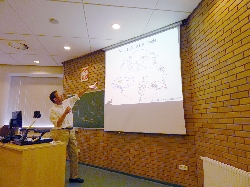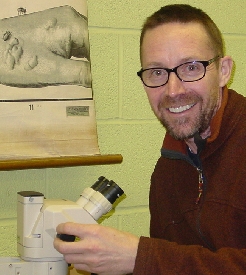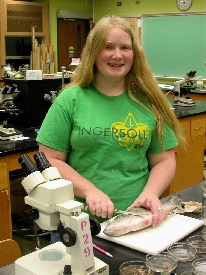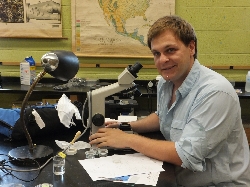University News
Parasite Research by WIU Professor, Students, Leads to International Collaboration
November 14, 2013
MACOMB, IL – Research on even the smallest parasite can sometimes reveal unexpected details of interactions between animal species. Now, research on host-parasite interactions has led to an international collaborative interaction between a Western Illinois University professor, his students and a European research colleague.
WIU Biological Sciences Associate Professor Shawn Meagher, two of his graduate students and biological science colleagues from across the globe have been studying parasites in Illinois fishes and in Montana forest mice for two works recently completed for academic journal publication. Meagher, who is a parasitologist, has studied a wide variety of hosts and parasites with his students.
Beth Lane, of Burlington, IA, who received her bachelor's and master's degrees in biology from WIU, is working with Meagher to publish a paper based on her 2013 master's degree thesis about the white grub worm found in the organs of game fishes. Part of the study centered on Macomb's Spring Lake and its populations of crappie and bluegill.
White grub is the juvenile of a flatworm with a complex life cycle that requires a snail, a fish and a fish-eating bird (like a Great Blue Heron) to serve as hosts for different developmental stages. This worm has been found in the organs of many different game fish species (such as bluegill, other sunfishes, crappies and basses), so it is generally considered to show a low degree of preference for any particular fish host. Lane completed the tedious task of removing and counting more than 120,000 worms from Spring Lake fish as part of her master's degree research, as well as summarizing field surveys of parasites in fishes over the last 80 years.
Meagher is currently working on a journal article about Lane's research to be submitted to an academic journal for publication.
"We found that the worm is choosier about its host than is generally perceived," Meagher said. "Bluegill are loaded with worms, but crappie have very few. That raises the question of what determines differences in infection levels: is it related to differences in how frequently fish encounter worms? Or is it caused by differences in susceptibility to infection? Several students in my lab are working on this question now."
Jonathan Vaughn, of Peculiar, MO, who received his master's degree in biology from WIU in 2013, was part of recently-published study in the journal Ecosphere about parasite populations of deer mice in the mountainous regions of Montana that have suffered the devastation of forest fires.
Meagher worked on the study of deer mice with a colleague he met while on sabbatical leave at the University of Montana, Rafal Zwolak, a rodent ecologist, who is currently an assistant professor in Poland, his home country. Meagher, supported by a WIU summer stipend and a College of Arts & Sciences Faculty Mentor Grant, returned to Montana several times, while Zwolak was finishing his PhD research. During Meagher's Montana visits, he began collaborating with Zwolak for the deer mouse study. Vaughn, who is now an instructor in WIU's Department of Agriculture, conducted much of the laboratory research at WIU on the mice as part of his master's degree thesis.
"I met Rafal while I was studying in Montana and during my return visits, we started this collaboration," he said. "He and others have found that after forest fires, the deer mouse populations explode and no one really knows why. Rafal had the idea that perhaps fires reduce parasite populations, and the absence of parasites might allow mouse populations to grow very rapidly. Unfortunately, there is very little information about the effects of fire on parasite populations, so he asked me to help get some."
The resulting study, titled "From Fleas to Trees," showed that the field mice sustained fewer infections with fleas after forest fires.
"Mice were collected from Montana forests in areas that were burned and those that were not burned," Meagher said. "The mice from the burned areas were infested by fewer fleas – in some cases five or six times lower. It's possible that the absence of fleas allows mice to reproduce better because they are not as ‘distracted' by skin irritation and constant itching, so they are more efficient at searching for food, or are better at avoiding predators. Although we don't know exactly how fewer fleas leads to more mice, we do know this: after a fire, there are fewer fleas and more mice. Since mice eat tree seeds, more mice means slower forest re-growth, and that could be bad. This finding, that fleas might indirectly slow forest regeneration, was a complete surprise; that's why we called the paper 'From Fleas to Trees,' to catch other researchers' attention and encourage them to do research in this area."
Meagher praised the detailed research performed by Vaughn, which included countless hours dissecting mice in the laboratories at WIU, and also learning the microscopic anatomical differences necessary to identify distinct parasite species. In the end, he identified 11 different fleas, three lice, two ticks and 13 parasitic worms, for a total of 31 different species.
As a result of the Montana deer mouse research, Meagher recently visited Zwolak at Adam Mickiewicz University in Poznan, Poland, in a trip that was partially funded by a Provost's Travel Grant. During the trip, Meagher gave a professional seminar and spoke to faculty and students about the fish research project. He also visited several Polish field sites to identify potential future research studies on Polish mice and their parasites for his next sabbatical leave.
For more information on the WIU Department of Biological Sciences, visit wiu.edu/biology.
Posted By: University Communications (U-Communications@wiu.edu)
Office of University Communications & Marketing





Connect with us: